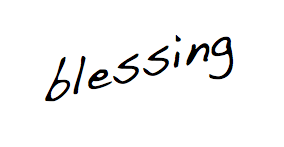A Lesson Learned: Blessing

The term “blessing” or “blessed” is thrown around so often, especially in the community of Christians. I myself use it quite frequently because it is really the only way to “sum up” a lot of life…my children are a blessing, my husband is a blessing, and we truly live in a blessed nation.
But upon further investigation, I’m not sure I really like this word any more. Here is how the Merriam-Webster Dictionary defines it.
noun: a thing conducive to happiness or welfare.
Really? That’s it.
It makes the term seem so shallow.
After reading this definition, I really wanted to dig a little deeper.
I am certainly not a Biblical scholar, but upon further investigation (using this resource from Lifeway), there are two words used for blessing: “eulogia” and “eulogeo”. Sound familiar? This is where we get the word eulogy. The definition, based on the greek word, for “eulogia” is:
1) praise, laudation, panegyric: of Christ or God
2) fine discourse, polished language
3) an invocation of blessing, benediction
4) consecration
5) a (concrete) blessing, benefit
And the definition of “eulogeo” is:
1) to praise, celebrate with praises
2) to invoke blessings
3) to consecrate a thing with solemn prayers
3a) to ask God’s blessing on a thing
3b) pray God to bless it to one’s use
3c) pronounce a consecratory blessing on4) of God
4a) to cause to prosper, to make happy, to bestow blessings on
4b) favoured of God, blessed
Quite a bit lengthier than our English definition, huh?
Sometimes a blessing is something concrete (as in the 5th description of “eulogia”), like an inheritance so often spoke of in the Old Testament (remember Jacob stole his brother Esau’s blessing/inheritance). Or perhaps it can even be our material “blessings” that we so frequently thank God for.
Other times it’s a prayer itself as in the 3rd definition of “eulogeo.”
Still other times, it’s a word of God’s favor (as in the 4b definition of eulogeo). This is one that I particularly have a beef with. None of us are “favored” in God’s eyes. We are sinners and our sin separates us from God. Yes, we are His children, His creation but we still fail Him daily.
But a revelation recently occurred to me…we are “blessed” or “favored in God’s eyes” because of His sacrifice. Because of His Son, we are now favored in God’s eyes!
Perhaps you really don’t care about the origins of the word ‘blessing’, but it will certainly cause me to think a little bit more about the real reason for our “blessings” the next time I use it!


Thanks for sharing this good reminder! We are blessed in so many ways but certainly the greatest being Christ’s sacrifice as you mentioned. How awesome that we can now find favor in God’s eyes because His Son makes us spotless and pure – Romans 6:3-4
One of the things that strikes me in Scripture is that God’s blessing is both bigger than the moment and bigger than individual or family. I think back, for example, to the big blessing that sets Israel’s history (and ours) into motion. Seemingly out of nowhere, God steps into the life of a man and woman who are unable to have children and says, “I will bless you so that you will be a blessing to all the families of the earth” (Gen 12:1-3). That moment sets things in motion. God’s blessing for Abraham is a promise for all families, not just for himself. It had a broad scope, a wider horizon than just Abram and Sarai. In fact, they really only barely touched what we might call blessing, living as strangers in a strange land, having left all that was safe and secure for life with a God they barely knew. But it was alright, they were in a story bigger than themselves; and they knew that it wasn’t just for them but for others, so they were willing to take the risk.
The rest of the story is about the power of that blessing, that promise, to move history in profound ways. Sometimes with the help of faithful people. Sometimes in spite of their obstinate self-serving ways. Usually through the people you would never expect (a scoundrel younger brother stealing a birthright, a Moabite woman faithfully staying with her widowed mother-in-law, a Syrian general with leprosy, a widow from Zarephath). The blessing, God’s promise of life, is strong and moves us into a future where we can relinquish our need to manage and control and govern things ourselves, so that we can be a blessing to others.
Also, when thinking creationally, God’s blessing is a force of life that is about freedom and blessing (i.e. God blessed the Sabbath and set it apart for the sake of people and creation, especially those who work hard labor).
Alright, far too many distractions this morning (from the blessing of two little rambunctious girls!) to write anything coherent. If there’s something helpful here, chalk it up to the power of God’s blessing. If not, you I’ll blame those holy distractions!
Definitions have definitely changed and weakened over the years. If you want a “true” definition of words, use Webster’s 1828 dictionary. http://www.1828-dictionary.com/d/search/word,blessing :)